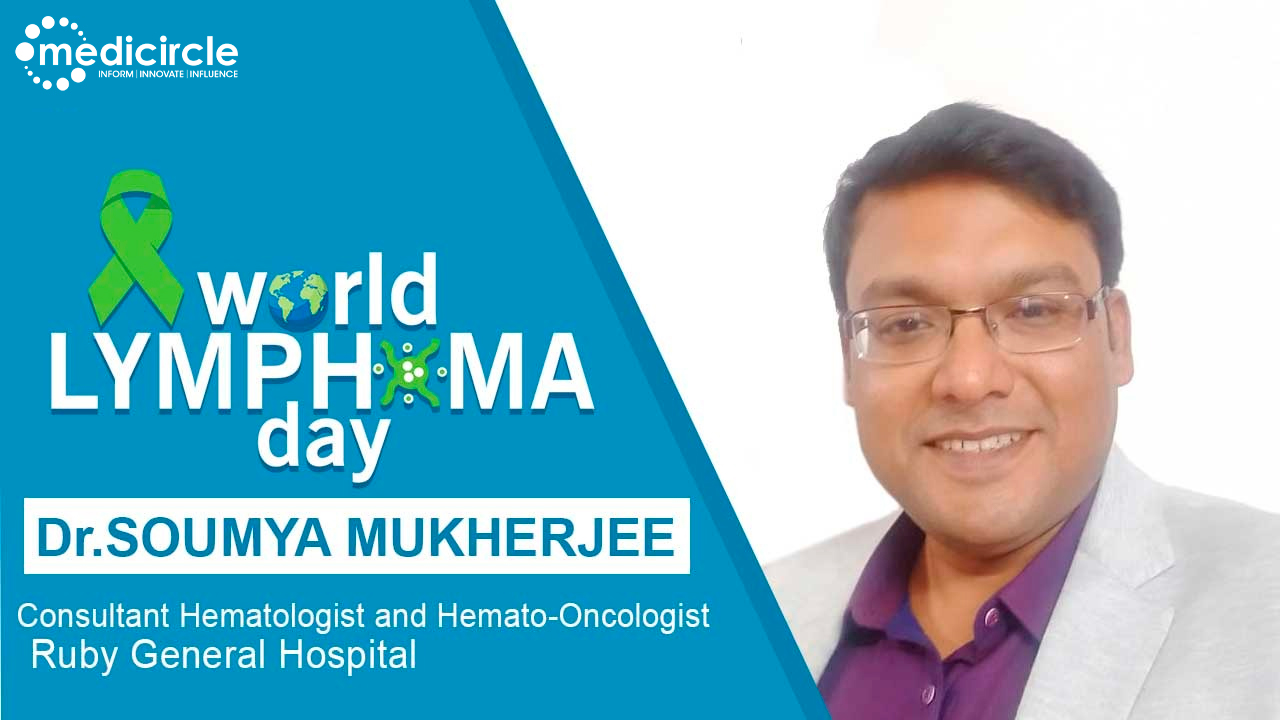Lymphoma is a haematological malignancy that affects the blood cells (lymphocytes). Lymphocytes (white blood cells) are part of the body's immune system. Lymphoma affects the lymph nodes and other types such as the spleen, liver, and bone marrow.
World Lymphoma Awareness Day (WLAD) is held on September 15 every year and is a day dedicated to raising awareness of lymphoma, an increasingly common form of cancer. It is a global initiative to raise awareness about lymphoma. WLAD was initiated in 2004 to raise public awareness of all lymphoma subtypes in terms of symptom recognition, early diagnosis and treatment.
Around the world, more than 735,000 people are diagnosed with lymphoma, every year. On the occasion of World Lymphoma Day, we at Medicircle are conducting an exclusive awareness series to impart basic knowledge and encourage people to know about lymphoma to detect cancer at an early stage.
Dr. Soumya Mukherjee is a Hematologist and Hematologic Oncologist at RUBY Hospital in Kasba, Kolkata. He was a former assistant professor at Burdwan Medical College. He has seven years of experience in Clinical Haematology and hemato-oncology. He has experience in treating haematological maligns, diseases, and autologous bone marrow transplants.
Lymphoma and its Types
He says, “There are multiple lymph nodes in our body. They are very important and act like the police. They prevent the entry of any foreign infection into our body. So if any malignant occurs in those lymph nodes then it is known as Lymphoma. It is a type of blood cancer. There are many types of blood cancers like Leukaemia, Myeloma, and Lymphoma. We can broadly classify Lymphoma into two types. One is Hodgkin lymphoma and the other is Non-Hodgkin lymphoma. As I have already mentioned the malignant of lymph nodes occurs here. Lymph nodes are present throughout our body and when they start growing and increasing, the tumourous proliferation causes swelling. In Hodgkin lymphoma, we get Reed-Sternberg cells which are not present in Non-Hodgkin lymphoma. We classify the type of lymphoma and accordingly give treatment.”
Symptoms of Lymphoma
He explains, “Recognising the symptoms is very crucial. Early detection is critical for any malignancy. Similarly in lymphoma, if we can detect and diagnose it early then a chance of complete cure is available. What are the symptoms you might wonder? The first is swelling in different parts of your body. Be it your neck region or abdomen. A key thing to remember is that these are painless swellings. The other symptom is a continuous low-grade fever without any infections. Usually, people just take an antibiotic but one must always consult the doctor before taking antibiotics. Another symptom is significant weight loss. Something on a scale of losing 10 plus KG in 6 to 7 months. The next symptom is drenching night sweats. Night sweats are key manifestations of lymphoma. Other symptoms like bleeding and dry cough should not be ignored if it persists for 3 to 4 weeks.”
Diagnosis and Treatments for Lymphoma
He explains, “If you have any swelling in the body plus the above-mentioned symptoms, you must consult a haematologist. After a clinical checking, the haematologist would go further with his/her investigation. There would be blood investigation, chemical investigation and then the main diagnostic modality, a biopsy would be done. One would undergo excision biopsy or tru-cut biopsy. We usually go for the former. After which there are few molecular tests which are like immunohistochemistry that can pinpoint a diagnosis. Diagnosis is the most important part. Because the diagnosis is wrong, the chance of cure is less. Later we go for the staging. For this, we have CT scans, MRIs, bone marrow tests, and more. After this, we go for the treatment. For lymphoma the main therapy is chemotherapy. For different types of lymphoma, there are different regimes. Before starting any chemotherapy regime, we carefully examine the patient. Mainly, chemotherapy and immunotherapy are the prime treatments, and radiotherapy and surgery too play a minor role. After the treatment is provided we have to carefully do follow-ups with the patient. Because if the patient now relapses then the only option left would be bone marrow transplantation.”
Avoiding Relapses
He mentions, “One cannot avoid it. In few lymphomas, the chance of relapse is very high, whereas in some it is low. Few non-Hodgkin lymphomas are known as low-grade lymphomas. In low-grade lymphomas, you may not treat the patient in the beginning. In such cases, we go for the wait and watch policy. Because the whole survival of the patient is the same irrespective if we treat him/her or not. So in cases of early low-grade lymphoma, we wait. But if it is an aggressive lymphoma or Hodgkin lymphoma, we need to treat it as soon as possible. Hodgkin lymphoma has a very good prognosis. Here there is a chance of 85-95% of the patients getting treated. In aggressive lymphomas, there is a 75-85% chance of cure but the chance of relapse is very strong. This is why h=there are many follow-ups done.”
(Edited by Priyal Shah)

 On the occasion of World Lymphoma Awareness Day, Dr Soumya Mukherjee sheds light on the symptoms and treatments available for Lymphoma.
On the occasion of World Lymphoma Awareness Day, Dr Soumya Mukherjee sheds light on the symptoms and treatments available for Lymphoma.



















.jpeg)












